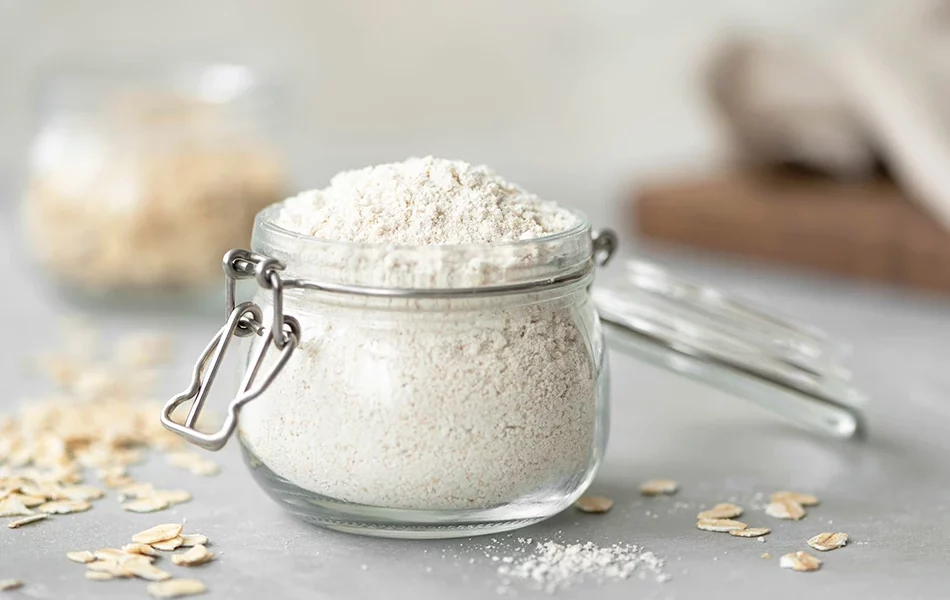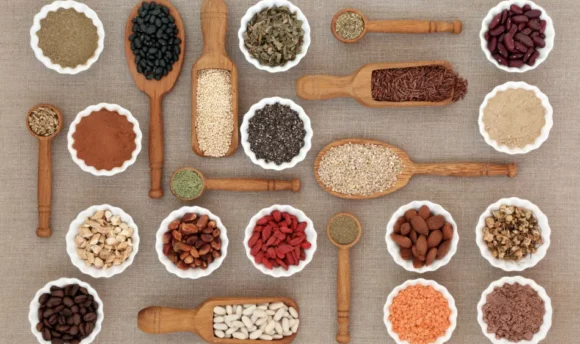Is Oat Flour Healthy? Nutrition Facts, Benefits, and Uses
Unlocking the truth: is oat flour a wholesome addition to your diet?

Oatmeal is a grain that has found its way into the kitchens of many people looking to improve their health. As a result, it is found in many forms, including oat flour.
Numerous studies have shown that this food has some great health benefits, but it is always a good idea to study its components in depth to determine if it is actually beneficial to your diet.
Our team can help you learn what oat flour has to offer your health and how you can use it.
Is Oat Flour Healthy?
The nutritional profile of oat flour makes it a healthy option.
The whole oats used in this product are naturally rich in dietary fiber, particularly soluble fiber called beta-glucan. Various health benefits have been associated with soluble fiber, including the ability to lower cholesterol and stabilize blood sugar.
Also, oat flour is a rich source of vitamins and minerals, including manganese, phosphorus, magnesium, and B vitamins. Several of these nutrients are essential for bone health, energy metabolism, and overall health.
The gluten-free properties of oat flour make it an ideal alternative to wheat flour for those suffering from gluten sensitivities.
If used mindfully and combined with other foods rich in nutrients, oat flour can be a healthy addition to your diet.
Is oat flour healthier than regular flour?
Oat flour is healthier because it is less processed than regular wheat flour since it is obtained by grinding the oat flakes with a food processor, preserving all its fiber and nutrients.
Wheat flour goes through a refining process by which it loses many of its nutrients, also raising its glycemic index.
On the other hand, wheat flour contains gluten, and although this is not an indicator of being less healthy, people sensitive to this protein can benefit from substituting wheat for gluten-free oat flour.
Nutritional Profile of Oat Flour
The nutritional profile of oat flour may vary depending on the brand. It is important to read the ingredients on the package to verify that the contents are only ground oat flakes, not a mixture of sugar and other ingredients.
The process of making flour at home is also very simple: you just need to blend rolled oats into a fine powder in a food processor. For later use, store homemade oat flour in an airtight container.
The following table shows the nutrients in whole-grain oat flour.
| Calories/Nutrient (per 100g) | Amount |
| Calories (kcal) | 389 |
| Net Carbs (g) | 59.4 |
| Fiber (g) | 10.5 |
| Sugar (g) | 0 |
| Fats (Total) | 6.31 |
| Protein (g) | 13.2 |
| Sodium (mg) | 4 |
| Cholesterol (mg) | 0 |
| Total saturated fat (g) | 0 |
Source: https://fdc.nal.usda.gov/fdc-app.html#/food-details/2261421/nutrients
Health Benefits of Oat Flour
You can get many positive effects by adding whole-grain carbohydrates to your diet; here are some of the benefits of oat flour:
#1 High in nutrients
Oat flour is indeed high in health-promoting nutrients. Foods such as oat flour have a high nutritional value because they provide the essential elements that your body needs to function properly.
Oats contain proteins, vitamins, minerals, and healthy fats, which support the functioning of the immune, cardiovascular, and musculoskeletal systems.
#2 Supports healthy digestion
Oats contain insoluble and soluble fiber, which is highly beneficial for maintaining healthy intestinal flora and promoting gut health.
To obtain these nutritional benefits, choose good quality oat flour, as there may be blends on the market that contain sugar. Read the label to verify that it contains only one ingredient: whole-grain oat flakes.
Whole grain oat flour preserves all the parts that make up the oats, including the hull.
#3 Provides a steady release of energy
Whole-grain oats are part of the macronutrient group known as carbohydrates. Carbohydrates are the body’s main source of energy because they are broken down into small molecules of glucose when metabolized.
Free glucose in the blood becomes the fuel necessary for you to perform your daily activities and your body systems to function properly.
The advantage of whole-grain carbohydrates is that they contain fiber, which slows their digestion.
This means that your body requires more time to process the oats and the glucose is not released into the bloodstream very quickly. In contrast, when carbohydrates are refined like regular wheat flour because they lack fiber, glucose rises sharply in your blood, causing an elevated insulin response that can affect your health.
#4 Might improve cardiovascular health
Oats can improve cardiovascular health in several ways by helping to lower cholesterol, control mild or borderline hypertension, and protect the heart thanks to their antioxidant action.
In addition, being a great food for weight loss, it prevents obesity, thus avoiding the risk of suffering the complications associated with being overweight, such as cardiovascular risk.
Potential Downsides of Oat Flour
In spite of the fact that it is considered a healthy food, you should keep in mind that everybody might react differently to it.
Take into account the following information:
Gluten intolerance
Oats are a gluten-free food, but most of the time, they are processed in places where other grains, such as wheat, barley, or rye are processed, which do contain gluten.
This results in contamination of the flour, which may cause symptoms of gluten sensitivity or intolerance in people suffering from celiac disease.
Bloating and gas
Fiber in oat flour, particularly soluble fiber like beta-glucan, can cause bloating and gas in some individuals. Gas can be produced in the gut as a result of this fiber fermenting. A healthcare professional should be consulted if discomfort persists.
For people with conditions such as irritable bowel syndrome or any gastrointestinal pathology that causes inflammation should not consume oat flour as their symptoms may worsen when consuming this product.
Oat Flour vs. White Flour
Check this comparison chart to understand the difference between regular wheat flour and oat flour.
| Differences | Oat flour | White flour |
| Content | Ground whole-grain oats | Refined wheat |
| Fiber | High in fiber due to minimal processing | Low in fiber due to refining processing |
| Gluten content | Gluten-free (some brands may contain gluten) | Contains gluten |
| Glycemic index | 25 – low (may help to keep blood sugar levels stable) | 85 – high (can increase blood sugar) |
| Nutrients | High nutritional value | Low nutritional value |
How to Use Oat Flour in Recipes
Before using this product, you should know that oat flour has a higher fiber content, which can make mixtures or doughs denser, so you should adjust the rest of the ingredients until you get the right texture.
In addition, oat flour can slightly vary the flavor of the preparations. However, it does not have a very predominant flavor, so it can be easily disguised with the rest of the elements of the recipes.
Learn these easy swaps to give you a better idea of how to substitute oat flour in your recipes:
- You can substitute oat flour for regular flour to make gluten-free bread. If you have a food processor at home, you can make your own gluten-free flour alternative by grinding the rolled oats.
- Your pancakes can have a healthier profile by using oat flour as the base of the recipe. By adding baking powder, you will get pancakes that are just as fluffy as the classic recipe with regular flour.
- Oatmeal cookies are a classic for those who love to bake. Try mixing oat flour and oat flakes with peanut butter and add a natural sweetener for super nutritious and easy-to-make cookies.
- Try making a healthy gluten-free birthday cake. This option is ideal for children as it gives them a healthier version that you can decorate with fresh fruit.
- Bread the chicken with a mixture of oat flour and spices and drizzle a little olive oil before baking. You will have a crunchy and delicious homemade chicken.
- Add a couple of tablespoons of oat flour to your stews or sauces for a thicker, more consistent mixture.
FAQs
Yes, oat flour is useful for a weight loss diet because it contains more insoluble and soluble fiber than regular flour, which promotes satiety. However, use it in moderation.
Oat flour is better due to its high nutritional profile. However, both have health benefits since they are unrefined and gluten-free flour. It is important to know that almond flour contains more calories.
Yes, baking with whole-grain oat flour is better for your health than regular flour because it adds a good amount of nutrients, fiber, and complex carbohydrates to your diet.
Oat flour may help to reduce inflammation due to its antioxidant and beta-glucan content. However, some people may experience inflammation if they are intolerant to oat components.
A Word From an MD
If you are looking for food options that have health benefits because you have problems with your blood sugar or blood pressure, oat flour or another gluten-free alternative on the market can be a great ally.
You can substitute regular flour with homemade oat flour, almond flour, coconut flour, or chickpea flour. These are all gluten-free options high in nutrients and good fats that will bring a better balance to your diet.
Having a food processor at home is very useful for preparing your own gluten-free flour mixes since you only need one ingredient. You can process rice grains, oat flakes, or quinoa into a fine powder that you can use for baking or thickening stews.
Conclusion
Oat flour is a healthy gluten-free alternative that stands out for its low processing, which allows it to retain all its nutrients.
The health benefits of oat flour are numerous thanks to its fiber, antioxidant, and complex carbohydrate content. These include reduced cardiovascular risk, gastrointestinal health, and energy intake.
To use oat flour in cooking, you only need to replace regular flour in equal proportion. Although the texture of the preparations may vary slightly, it is a better gluten-free alternative to add more nutrients to your daily diet.

















































 Select your language:
Select your language: 








